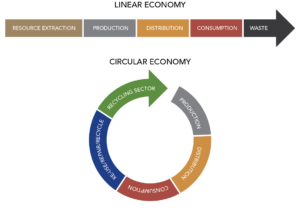The circular economy is one of the key sustainability issues. It is being wholeheartedly embraced by companies, governments and citizens alike, as it saves costs, creates jobs, and has the potential to save the planet. This is why it features at the top of the agenda of Sustainable Brands Barcelona’s professional meetings on May 23 and 24 at the IESE Business School.
Circular economy is not only about resource chains, reuse and remanufacturing but also the skills we need our kids to learn to prepare for the future
Speakers addressing the Circular economy and the opportunities that brings include Andy Ridley, CEO at Circle Economy in The Netherlands, a social enterprise that groups together companies, NGOs, and adminstrations to build programs and tools to help accelerate the scalable adoption of the circular economy across businesses, governments and communities. Andy was responsible for the global climate change initiative, «Earth Hour» where he helped attract hundreds of millions of people from over seven thousand cities to participate in this global movement. As CEO of Circle Economy he is using this experience to rise awareness on one of the stellar topics od Sustainable Brands Barcelona 2016, the circular economy.
The current global economic model can be described as a «linear production». We extract raw materials from the earth, we use them to manufacture products that are then used and eventually thrown away. The problem is that this «linear economy» is unsustainable on a planet with finite recourses like ours.
Circular economy refers to a business model that promotes the production of goods and services in a way that reduces the consumption of raw materials while reducing waste. Unlike the linear economy, a circular economy proposes to reduce, reuse, repair and recycle in a continuous circle, imitating the way nature itself works.
The Netherlands is widely considered to be the leader in the global race towards a circular economy. The country has made the circular economy a major focus of its presidency of the Council of the European Union.
A good example of business in The Netherlands is Royal Philips, a technology company focused on improving people’s lives through meaningful innovation. Markus Laubscher, Director of Sustainability and Circular Economy, is leading by making their designs easier to repair, upgrade and modify, as well as implementing remanufacturing and refurbishment programs and projects. Not only are their sights set internally, Philips are also raising awareness about the circular economy in the wider business community.
Another representative example of The Netherlands dedication to circular economy is Mud Jeans, a Dutch denim company leaded by Bert van Son, the originator of the «Lease a Jeans» concept. His idea is that consumers will no longer buy jeans, but lease them. This way, the fashion label retains ownership of the jeans and most importantly, the raw materials. The jeans are made from certified cotton and are designed for disassembly to enable effective recycling.
They are companies like these that have driven the Netherlands to the leadership position in circular economy. The Netherlands is the guest country of this year’s Sustainable Brands Barcelona (23rd & 24th of May) where circular economy is the star topic. Bert van son, Markus Laubscher and Andy Ridley will be talking about circular economy. They will bejoined on the stage by other forty thought leaders addressing other topics such as communicating sustainability, building your business case around sustainability, attracting investment through sustainability, innovation… all under one roof at the IESE Business School of Barcelona.
Tickets are on sale now with discounts until April 29th. You may book here.








